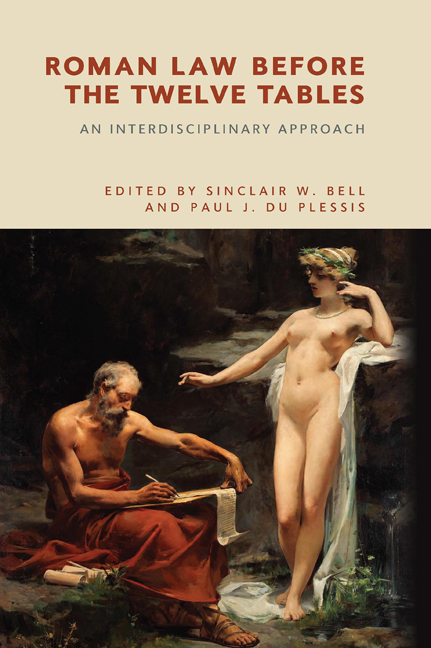Book contents
- Frontmatter
- Contents
- The Contributors
- Introduction: The Dawn of Roman Law
- Part I The Materiality of Roman Law: New Archaeological Discoveries
- 1 Roman Law in its Italic Context
- 2 Central Italian Elite Groups as Aristocratic Houses in the Ninth to Sixth Centuries BCE
- 3 Authority and Display in Sixth-Century Etruria: The Vicchio Stele
- Part II Constructing Early Roman Law: Sources and Methods
- 4 The Twelve Tables and the leges regiae: A Problem of Validity
- 5 The leges regiae in Livy: Narratological and Stylistic Strategies
- 6 The leges regiae through Tradition, Historicity and Invention: A Comparison of Historico-literary and Jurisprudential Sources
- 7 The Laws of the Kings – A View from a Distance
- 8 Beyond the Pomerium: Expansion and Legislative Authority in Archaic Rome
- Part III Roman Law in Historiography and Theory
- 9 Niebuhr and Bachofen: New Forms of Evidence on Roman History
- 10 Finding Melanesia in Ancient Rome: Mauss’ Anthropology of nexum
- Index
1 - Roman Law in its Italic Context
Published online by Cambridge University Press: 22 September 2020
- Frontmatter
- Contents
- The Contributors
- Introduction: The Dawn of Roman Law
- Part I The Materiality of Roman Law: New Archaeological Discoveries
- 1 Roman Law in its Italic Context
- 2 Central Italian Elite Groups as Aristocratic Houses in the Ninth to Sixth Centuries BCE
- 3 Authority and Display in Sixth-Century Etruria: The Vicchio Stele
- Part II Constructing Early Roman Law: Sources and Methods
- 4 The Twelve Tables and the leges regiae: A Problem of Validity
- 5 The leges regiae in Livy: Narratological and Stylistic Strategies
- 6 The leges regiae through Tradition, Historicity and Invention: A Comparison of Historico-literary and Jurisprudential Sources
- 7 The Laws of the Kings – A View from a Distance
- 8 Beyond the Pomerium: Expansion and Legislative Authority in Archaic Rome
- Part III Roman Law in Historiography and Theory
- 9 Niebuhr and Bachofen: New Forms of Evidence on Roman History
- 10 Finding Melanesia in Ancient Rome: Mauss’ Anthropology of nexum
- Index
Summary
INTRODUCTION
Where does Roman law come from? There are several possible answers to this question. First, it is possible that Roman law is an outgrowth of an oral tradition of law shared with other Indo-European languages. Second, Roman law might reflect legal traditions that developed in Italy over centuries of interaction between local communities; a parallel situation is envisaged to explain the Roman onomastic system, which appears to be the product of a cultural koiné between the peoples of central Italy in the first half of the first millennium BCE. A third possible source of Roman law is the influence from other cultures in the ancient Mediterranean: several ancient Near Eastern cultures had developed sophisticated law-codes already in the second millennium BCE; Greek and Phoenician traders and colonists may well have spread legal traditions and law-codes into the western Mediterranean. The Romans themselves, as is well known, gave various accounts which stressed their debt to Greek law, including the story that Numa had gained his legal learning from Pythagoras, and another that three commissioners responsible for the Roman law of the Twelve Tables were sent by the Senate to copy Solon's laws at Athens and those of other Greek states.
These three possible origins do not necessarily stand in opposition to each other, and there may very well be no single source of Roman law. Whatever the original impetus for legal institutions or practices in Rome was, the Romans adapted these to their own purposes. Indeed, even a very brief examination of the etymology of some Latin legal terminology supports a view that different tributaries fed into the stream of Roman law, and that as these waters merged they gave rise to something new and different. Some Latin words relating to legal concepts and practices are inherited from the vocabulary of the parent language, known as Proto-Indo-European: for example, ius ‘justice’ and iustus ‘just’, words which have parallels in Indo-Aryan and Celtic languages; appear to be shared among the Indo-European languages of Italy, but not further afield in the Indo-European language family, such as lex ‘law’ and derivatives; and there are other words which show shared semantic ranges across Indo-European and non-Indo-European languages, such as the terms relating to slavery, and the concept of the familia; finally, a few legal terms are borrowed from Greek, for example, poena ‘penalty’.
- Type
- Chapter
- Information
- Roman Law before the Twelve TablesAn Interdisciplinary Approach, pp. 9 - 24Publisher: Edinburgh University PressPrint publication year: 2020



